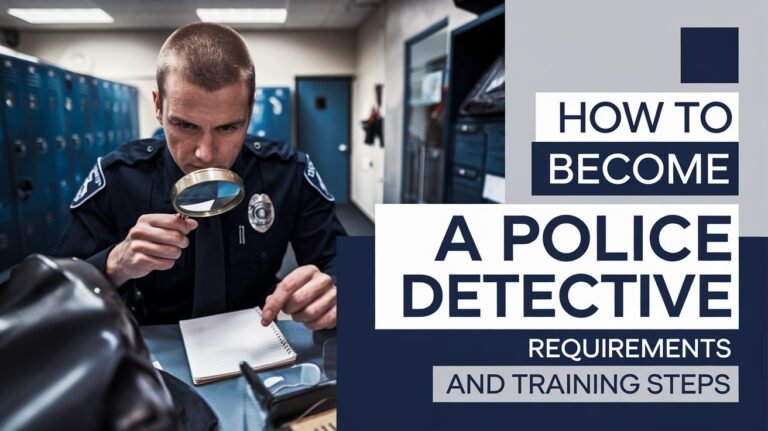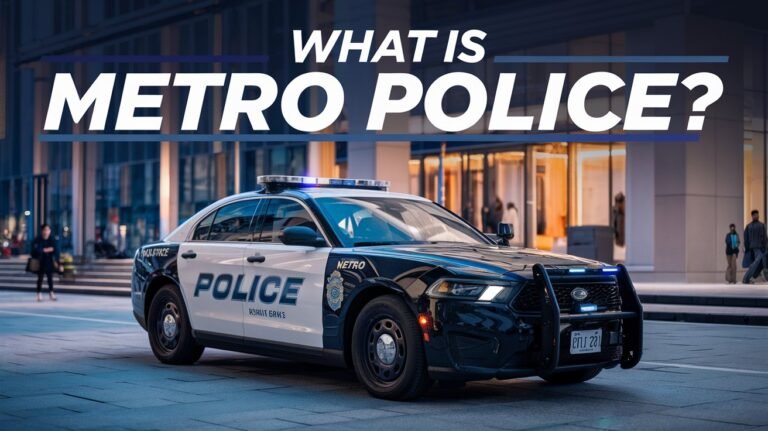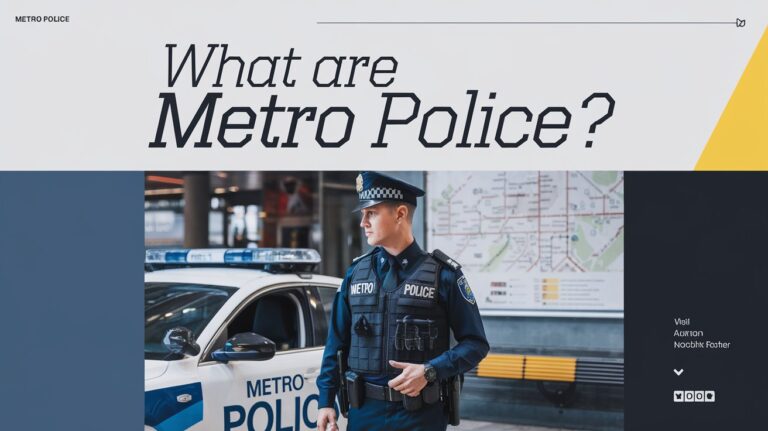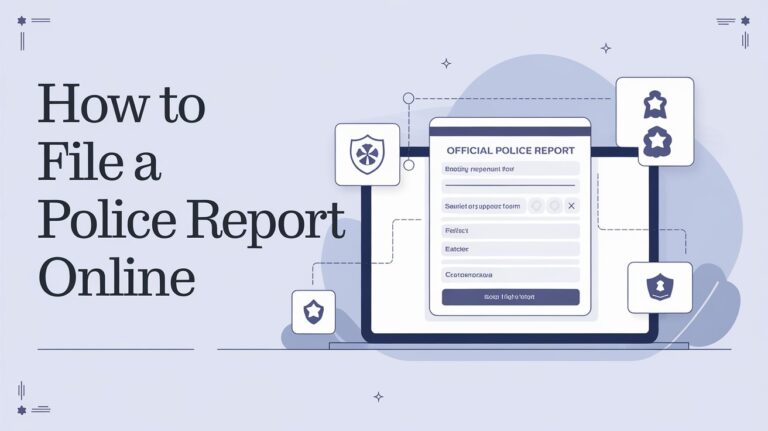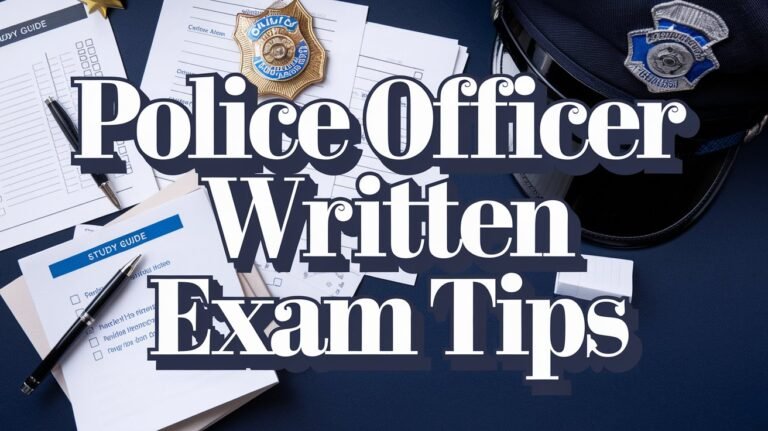How to Prepare for Police Exams: Tips & Practice Strategies
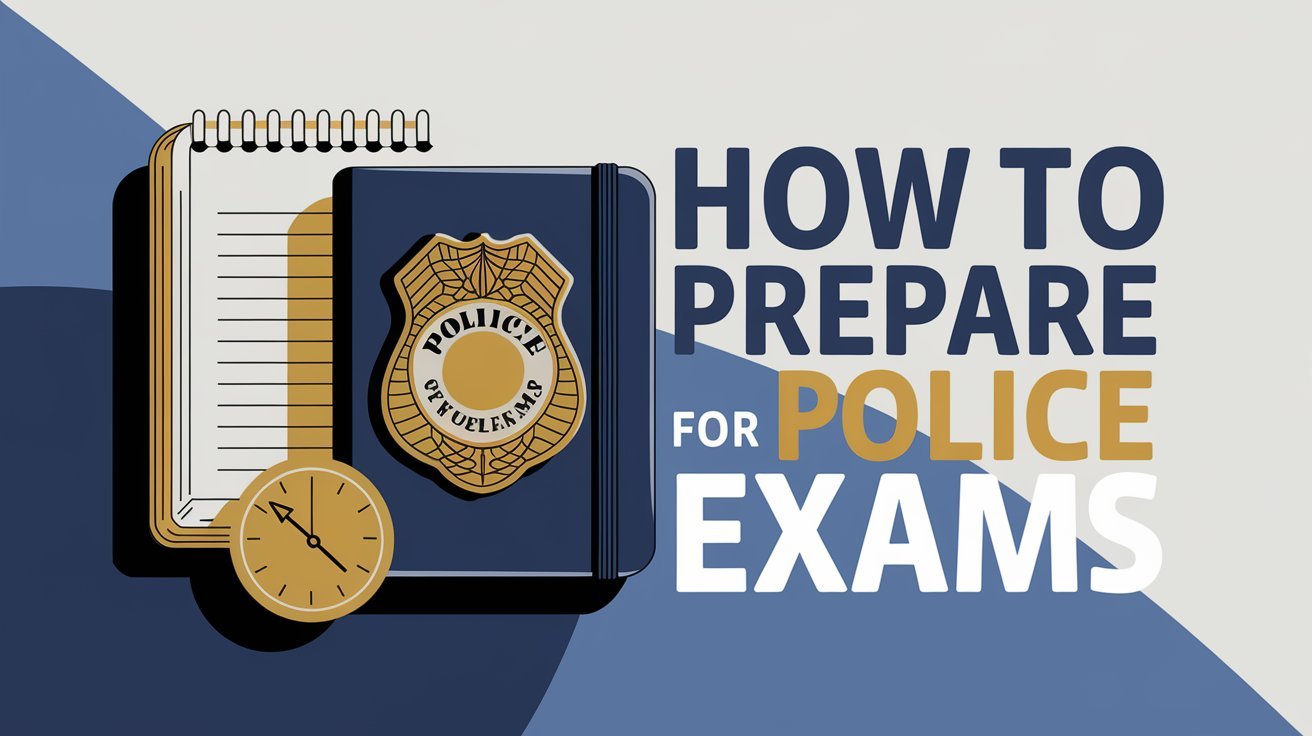
Are you ready to take the plunge and pursue a career in law enforcement? The police entrance exam process can be daunting. But with the right preparation, you can boost your chances of success.
Ever wondered what makes top-scoring candidates stand out? It’s their strategic approach to exam prep.
Police Entrance Exam Components Structure
Aspiring law enforcement officers face a tough selection process. Knowing the police entrance exam’s structure is key. The exam tests physical fitness, cognitive skills, and how well you work with others.
Written Assessment Components
The written part of the exam is very important. It has multiple-choice questions on math, reading, writing, and logic. You need to show you can analyze, solve problems, and communicate well.
Physical Fitness Requirements
Being fit is crucial for a law enforcement career. The exam includes a physical test. This might be running, sit-ups, push-ups, and obstacle courses. It checks if you’re strong, agile, and can handle the job’s demands.
Interview Process Elements
The interview is a key part of the exam. You’ll have an oral board interview. They’ll check your communication, problem-solving, and teamwork skills. This helps decide if you’re right for the job.
Some police departments also do a psychological test and a background check. Knowing the exam’s structure helps you prepare. It boosts your chances of doing well.
Written Test Content Areas
Aspiring police officers face a detailed written exam. It tests their skills in many areas. These include basic math concepts, reading comprehension, writing skills, and logical reasoning. Some tests also check situational judgment, memory, and observation skills.
The National Police Officer Selection Test (NPOST) is common in many states. Some agencies have their own tests or use third-party providers. It’s important for candidates to know the test format and content of the department they’re applying to.
- The police officer entrance exam measures four main areas: math skills, reading comprehension skills, language skills, and writing skills.
- Each test section is timed, typically between 15 and 25 minutes, and contains 10 to 25 questions.
- The minimum passing score on all four sections combined is 75%.
To do well on the police written test, candidates need good police written test strategies. They should also get to know the test format and content. By practicing regularly, aspiring police officers can improve their chances of success.
How to Prepare for Police Exams
To pass police exams, you need a solid plan. You must pick the right study materials, manage your time well, and practice with test strategies. This will help you do well in these tough tests.
Study Materials Selection
Choosing the right study materials is key. Start with what your department offers, like study guides and sample tests. Online resources, video lessons, and practical guides can also help. They give you extra info to understand the exam better.
Time Management Techniques
Managing your time is very important. Spread out your study time over different subjects. Don’t cram at the last minute. This way, you’ll be ready for all parts of the exam.
Practice Test Strategies
Practice tests are a great way to get better. They make you familiar with the exam’s format and time limits. By knowing your weak spots, you can improve those areas. This boosts your chances of doing well on the real test.
“Thorough preparation is required for the competitive police exam. By utilizing a diverse range of study materials, managing time efficiently, and employing effective practice test strategies, aspiring law enforcement officers can maximize their chances of success.”
Physical Agility Test Standards
Aspiring police officers must show their physical fitness in the police agility test. This test checks their strength, endurance, and agility. These are key for the tough job of a police officer. The test standards make sure recruits can handle the job’s physical demands.
The police agility test includes several parts:
- Timed runs, both sprints and longer distances, to assess cardiovascular fitness and speed
- Obstacle courses that challenge agility, balance, and coordination
- Strength tests such as push-ups, sit-ups, and pull-ups to evaluate upper body and core muscle power
- Lifting and carrying exercises to simulate rescue scenarios
To get ready for the police physical fitness test, candidates need to exercise regularly. They should also work on their strength. Being physically fit is key for passing the test and doing the job well.
| Fitness Metric | Female 20-29 | Male 20-29 | Female 70th Percentile | Male 70th Percentile |
|---|---|---|---|---|
| Sit-ups (1 minute) | 35 | 40 | 41 | 45 |
| Push-ups | 18 | 33 | 24 | 41 |
| 1.5-mile Run (minutes) | 14:07 | 11:58 | 12:53 | 10:59 |
To pass the physical agility test and graduate, candidates must meet the 70th percentile in each area. Proper law enforcement physical standards preparation is crucial for aspiring police officers to succeed in the police agility test requirements.
Oral Board Interview Preparation
The police oral board interview is a key part of becoming a police officer. It tests your ability to work with others, communicate well, and solve problems. Being well-prepared can really help you do well in this important interview.
Common Interview Scenarios
Police oral board interviews often ask you to deal with tough situations. You might face questions about:
- Ethical dilemmas, such as how to handle a fellow officer’s misconduct
- Conflict resolution situations, like responding to a heated domestic dispute
- Hypothetical law enforcement scenarios, exploring how you would manage challenging on-the-job situations
Professional Presentation Tips
Looking professional is key during the police oral board interview. Wear a suit or formal clothes and keep your grooming neat. Be confident, make eye contact, and speak clearly and briefly.
Response Techniques
When answering questions, show your integrity, decision-making skills, and ability to stay calm. Practice common interview questions and do mock interviews to improve your answers. Keep your answers short and honest, showing why you’re right for the job.
| Key Factors for Successful Police Oral Board Interviews | Descriptions |
|---|---|
| Professional Presentation | Dress appropriately, maintain eye contact, and speak clearly and confidently. |
| Ethical Decision-Making | Demonstrate integrity and consideration for the department’s reputation in your responses. |
| Communication Skills | Articulate your thoughts effectively, listen actively, and respond concisely to questions. |
| Problem-Solving Abilities | Showcase your critical thinking and decision-making skills in hypothetical scenarios. |
| Passion for Law Enforcement | Convey your genuine interest and dedication to the law enforcement profession. |
Preparing well for the police oral board interview, you can stand out as a top candidate. This is a big step towards your career in law enforcement.
Police Report Writing Skills
Effective police report writing is key in law enforcement exams. Candidates have about 20 minutes to show their skills. They must organize info and write clearly.
To do well in the police exam writing section, you need strong law enforcement documentation skills. This means reading details well, picking out what’s important, and making smart suggestions. You should write simply and use important police terms.
It’s important to practice. Write sample reports quickly, focusing on clear writing and proper grammar. This shows you’re ready for police work.
“The ability to filter and organize information into a comprehensive report is a crucial skill assessed in police exams across North America.”
Experts say to keep it simple. Don’t use too much jargon or extra words. Stick to a clear, easy-to-follow structure and focus on key points.
Spelling, grammar, and how easy it is to read are also important. You need to stay focused and keep your cool while working under pressure.
- Read provided information carefully
- Identify relevant details and separate from irrelevant ones
- Formulate clear recommendations and actions
- Write concisely and clearly using law enforcement terminology
- Practice report writing under timed conditions
- Prioritize effective communication, proper grammar, and neat handwriting
Learning these skills, you show you’re ready for police work. This is true for both the exam and real-life situations.
Math and Reading Comprehension Focus
Aspiring law enforcement officers need to be good at math and reading. These skills are key for the job, like analyzing data and understanding reports.
Essential Math Concepts
The math part of the police exam tests basic skills like addition and subtraction. You’ll also face word problems and fraction questions. Scoring 70% or more is the goal, so knowing these math basics is important.
Reading Analysis Methods
The exam also checks your reading skills. It looks at how well you get important info from hard texts. Learning to spot main ideas and details is key to doing well.
Practice Question Types
- Word problems testing math skills
- Data interpretation exercises
- Passage analysis and comprehension questions
Practicing with different types of police test questions helps improve your skills. Using study guides and online tools can also help you get better at math and reading.
| Skill | Importance | Passing Score |
|---|---|---|
| Police Exam Math | Essential for data analysis and problem-solving | 70% or higher |
| Reading Comprehension | Crucial for interpreting complex reports and information | 70% or higher |
“The key to acing the police exam is mastering the fundamental math and reading skills required for the job. With consistent practice, you can develop the competencies needed to excel.”
Psychological Evaluation Process
Becoming a police officer involves a challenging selection process. The psychological evaluation is a key part of it. It’s done by licensed psychologists to check if a candidate is mentally fit for law enforcement.
The exam has about 100 questions and takes 15 minutes. It asks candidates to agree or disagree with statements on a five-point scale. Traits like being conscientious, emotionally strong, and a good team player are checked. This ensures they can handle the job’s demands.
Standardized tests, like the Big Five Model, are often used. Candidates should get used to the exam format and answer styles. This can help them do better.
“Passing the police psychological exam is crucial, as it helps assess the candidate’s mental condition, fitness, and compatibility with police work,” explains Jane Doe, a clinical psychologist specializing in law enforcement assessments.
The psychological assessment aims to see if a candidate can do the job well. It checks if they won’t risk the public or the department. Being honest is key, as trying to cheat can lead to being disqualified.
Passing the police psychological evaluation shows a candidate is ready to serve the community. It ensures everyone’s safety and well-being.
Background Check Requirements
The police background check is a key step in becoming a police officer. It looks into your personal history, criminal record, finances, and character. This thorough check helps keep the police force trustworthy and protects both the public and the department’s image.
Having a felony conviction is a big no-no. Serious misdemeanors, drug use, and past drug abuse can also stop you. Other reasons for rejection include a dishonorable military discharge, bad credit, and a history of domestic violence.
- Felony convictions
- Serious misdemeanors
- Current drug use or past drug abuse
- Dishonorable discharge from military service
- Bad credit history
- History of domestic violence
- Not clean driving license
- Unreported past crimes
- Past or current gang affiliations
- Poor employment record
- Incorrect, false, or incomplete information given on the application form
Length of a background check varies. Some take weeks, while others take months. For federal jobs, it can take up to 12 months because of strict rules.
Being truthful is crucial during the background check. Lying or hiding information can lead to serious penalties. It’s best to be open and honest to avoid any issues.
| Common Police Background Check Disqualifiers | Estimated Timeframes |
|---|---|
| Felony convictions Serious misdemeanors Current drug use or past drug abuse Dishonorable discharge from military service Bad credit history History of domestic violence Not clean driving license Unreported past crimes Past or current gang affiliations Poor employment record Incorrect, false, or incomplete information given on the application form | Couple of weeks to several months, depending on the complexity of the candidate’s past residences and employment history. Up to 12 months for federal law enforcement agencies like U.S. Customs and Border Protection, due to clearance requirements for access to classified information. |
The police background check is a detailed and strict part of becoming a police officer. You must be ready to share all about your past. Being truthful is key to avoid being disqualified.
Test Day Success Strategies
As the police exam day gets closer, having a plan is key. Arrive at the test site at least 30 minutes early. This helps you start smoothly and keeps stress low. Bring all needed ID and materials, and get a good night’s sleep to stay sharp.
Manage your time well during the exam. If a question is tough, skip it and come back later. This strategy can help you score better. Stay calm and use police exam day tips and law enforcement test strategies to improve your chances.
For the physical test, warm up well and pace yourself. In the oral interview, keep eye contact, speak clearly, and think before answering. Show your knowledge, skills, and commitment to law enforcement throughout the police exam success techniques.

